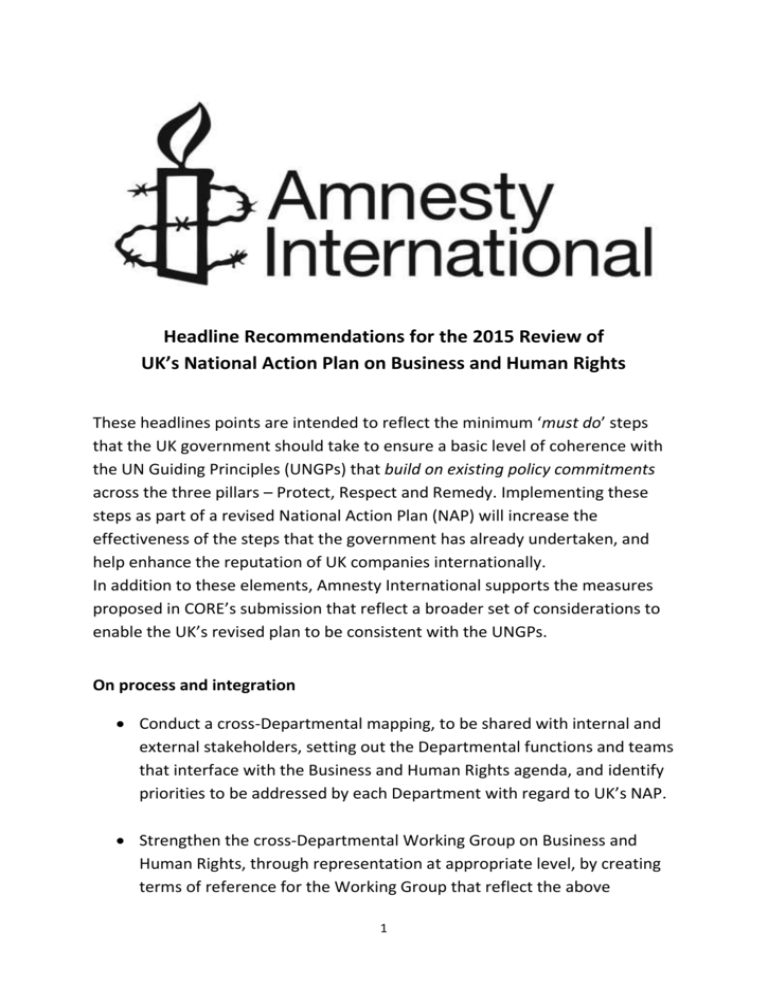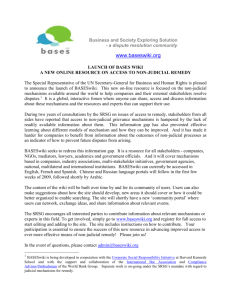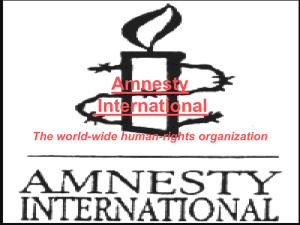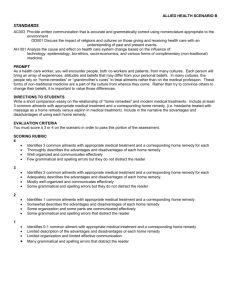the full document here
advertisement

Headline Recommendations for the 2015 Review of UK’s National Action Plan on Business and Human Rights These headlines points are intended to reflect the minimum ‘must do’ steps that the UK government should take to ensure a basic level of coherence with the UN Guiding Principles (UNGPs) that build on existing policy commitments across the three pillars – Protect, Respect and Remedy. Implementing these steps as part of a revised National Action Plan (NAP) will increase the effectiveness of the steps that the government has already undertaken, and help enhance the reputation of UK companies internationally. In addition to these elements, Amnesty International supports the measures proposed in CORE’s submission that reflect a broader set of considerations to enable the UK’s revised plan to be consistent with the UNGPs. On process and integration Conduct a cross-Departmental mapping, to be shared with internal and external stakeholders, setting out the Departmental functions and teams that interface with the Business and Human Rights agenda, and identify priorities to be addressed by each Department with regard to UK’s NAP. Strengthen the cross-Departmental Working Group on Business and Human Rights, through representation at appropriate level, by creating terms of reference for the Working Group that reflect the above 1 mapping and commitments set out in the NAP, and by allocating roles and responsibilities to make this happen. Ensure planned actions are specific with success criteria, measurable targets and timetables. Rebalance the NAP to enable it to reflect better all three pillars of the UNGPs and to address the most serious business-related human rights abuses. Conduct a further review in 2017 of UK’s progress in taking forward the UNGPs and implementing the National Action Plan. On Duty to Protect Monitor implementation of the TISC provision of the Modern Slavery Act, identify gaps and blockages, and take the steps necessary to ensure more effective implementation with regard to the eradication of slavery from supply chains. Integrate human rights considerations into Public Procurement Policy with regard to the 2014 EU Procurement Directive, in a way that will send signals to companies that their contracts with central/local government might be at risk if they fail to respect human rights across their operations. Require DFID’s private sector partners to commit to undertake human rights due diligence, in keeping with the UNGPs, so that these companies do not have adverse impacts on the rights of people in developing countries whose lives they seek to improve. Monitor how embassies and missions abroad are supporting human rights defenders working on issues relating to business and human rights, in line with the UN and EU Guidelines on Human Rights Defenders, and require improved action from those missions abroad that are doing little. 2 Lobby foreign states bilaterally to develop and implement National Action Plans on the UNGPs, and encourage integration of the UNGPs within multilateral institutions and instruments, including trade and investment agreements, to help create a level playing field internationally. On Responsibility to Respect Ensure consistency of Government guidance to companies, including briefings produced by UKTI and FCO, so that the UNGPs are reflected in a wide range of print and online material intended to raise companies’ awareness of risk and country-specific contexts. Instruct UK embassies and missions abroad to raise human rights issues with UK companies and communicate to them Government expectations that they respect human rights, especially in situations where there is concern that they may have caused or contributed to human rights abuses. Encourage companies to promote Freedom of Association and the living wage throughout their global supply chains, and to enter into agreements with their sub-contractors and trade unions to further this. On Remedy – criminal sanctions (these fall within the remedy pillar in so far as victims of corporate abuse want to see the perpetrators held accountable for their crimes) Ensure investigators and prosecutors have the resources, knowledge, expertise and capacity needed to successfully investigate and prosecute corporate crime with regard to existing laws, including those with an extra-territorial dimension; e.g. section 1A of the Criminal Law Act 1977. Develop and adopt into law a consistent and coherent concept of corporate criminal liability that would enable authorities to investigate and prosecute UK companies involved in serious crime overseas. 3 On Remedy – judicial and non-judicial Take steps to limit the financial risk taken by victims and by law firms acting for them, in bringing civil actions in the UK against multinational corporations, for human rights related harm occurring in the UK or abroad. Avoid treating company grievance procedures as a substitute for judicial and non-judicial remedy in cases of serious harm, where lives and health are at risk, and in contexts where justice cannot be properly served through a company-led grievance procedure. Overhaul the complaints procedure of the UK National Contact Point for the OECD Guidelines for Multinational Enterprises to enable all complaints to be assessed and examined in keeping with the Human Rights Chapter of the OECD Guidelines and with the UNGPs. Introduce sanctions for companies found to be in breach of the OECD Guidelines for Multinational Enterprises, including denial of access to Government contracts, export credits, and other forms of Government support for their activities. 30 July 2015 For further information contact: Peter Frankental Economic Relations Programme Director Amnesty International UK Email: peter.frankental@amnesty.org.uk Tel: +44 (0)207 033 1599 4











